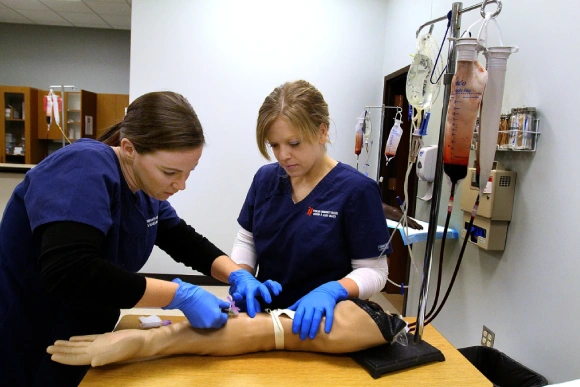What is an Administrative Medical Assistant?
An administrative medical assistant is a healthcare professional who handles various office tasks. They take the front desk, organize appointments, manage patient records, deal with insurance claims, and ensure the office operates smoothly. Patients often interact with them first, receiving helpful information and support.
Duties and Responsibilities
The tasks of an administrative medical assistant can vary based on the healthcare setting and office needs. However, typical responsibilities include:
- Welcoming and registering patients, confirming details, and gathering required paperwork.
- Arranging appointments for patients and coordinating with other healthcare providers.
- Handling phone calls and addressing queries from patients, healthcare professionals, and staff.
- Managing patient records and updating personal details, medical history, and insurance information.
- Aiding in insurance claims and billing procedures, ensuring accuracy and timely submissions.
- Monitoring office supplies, ordering new ones when needed, and maintaining office organization.
- Assisting healthcare professionals with administrative tasks like preparing medical reports and correspondence.
- Supporting patients by answering questions and ensuring their comfort during visits.
Education and Training
To become an administrative medical assistant, you must finish a vocational training program or earn an associate degree in medical assisting. These programs are available at vocational schools, community colleges, and some universities. The program duration can vary. Depending on the education and training level, it typically lasts several months to two years.
Throughout the program, you’ll gain various skills and knowledge crucial for the essential tasks of administrative medical assistant to be performed. The curriculum covers topics like:
- Medical terminology: Understanding the language and vocabulary used in healthcare settings.
- Medical office procedures: Grasping the organizational processes and procedures specific to medical offices.
- Electronic health records: Using electronic health record systems for managing patient data.
- Insurance billing and coding: Learning the fundamentals of medical coding and billing, including understanding insurance terminology and reimbursement processes.
- Medical ethics and professionalism: Comprehending the ethical guidelines and professional standards applicable in healthcare settings.
- Communication skills: Developing practical communication skills to interact with patients, healthcare professionals, and other staff members.
Requirements to Become an Administrative Medical Assistant
To become an administrative medical assistant, you must meet specific requirements. These can vary by employer and state, but some common ones include:
- High school diploma or equivalent: Most employers ask for at least a high school diploma or GED.
- Completion of a training program or associate degree: Employers may prefer candidates who finished a formal training program in medical assisting.
- Certification: While only sometimes needed, having certification can make you more appealing to employers. The Certified Medical Administrative Assistant (CMAA) certification from the National Healthcareer Association (NHA) is well-recognized.
- Good communication and people skills: Administrative medical assistants must communicate well with patients, healthcare professionals, and other medical staff.
- Attention to detail: The role requires paying close attention to ensure accurate record-keeping, billing, and scheduling.
- Organizational skills: Administrative medical assistants should be organized and able to handle multiple tasks simultaneously.
- Computer skills: Knowing how to use electronic health record systems, word processing software, and other office applications is essential.
Recommended for you
-
Medical Assistant Program
Take our accelerated Medical Assistant with Clinical Labs program at our Arlington campus and start a new career in as little as 8 months!
Radiology Technician Training
Take our accelerated Radiology Technician Training program at our Arlington campus and start a new career in as little as 8 months!
Medical Billing And Coding Specialist Program
Our 100% online accelerated Medical Billing and Coding Specialist Program makes it possible for you to train for a new career in as little as 25 weeks!
Pharmacy Technician Training Program
Our 100% online accelerated Pharmacy Technician Training program makes it possible for you to train for a new career in as little as 25 weeks!
Medical Assistant Program
Our 100% online fast track Medical Assistant program makes it possible for you to train for a new career in as little as 6 months!
Steps to Become an Administrative Medical Assistant
Now that you’re aware of what’s needed and the education and training involved, let’s go through the steps to become an administrative medical assistant:
- Research and choose a respected vocational training program or community college offering a medical assisting program. Look for accredited programs with a good industry reputation.
- Apply and enroll in your selected program, meeting admission requirements and submitting necessary documents.
- Complete the required coursework and training, including both classroom and hands-on instruction in a healthcare setting.
- Think about getting certified. While only sometimes necessary, certification can showcase your skills. Explore options like the CMAA certification from the NHA.
- Gain practical experience through internships or externships. Many programs provide opportunities for real-world experience in medical offices or healthcare facilities.
- Update your resume and start applying for administrative medical assistant positions. Network with professionals and use job search resources to find suitable opportunities.
- Prepare for interviews by reviewing common questions and practicing your responses. Highlight your education, training, and relevant skills and experiences.
- Once you secure a job as an administrative medical assistant, keep enhancing your skills through professional development and staying informed about industry trends.
Job Outlook
Good news – there’s a promising job outlook for Medical Administrative Assistants! As of May 2020, the U.S. Bureau of Labor Statistics stated that there’s a 19% increase in jobs from 2019 to 2029, which is faster than the average for all jobs.
Final Thoughts
Are you considering a career as an administrative medical assistant? It’s a satisfying choice for those interested in healthcare but prefer administrative tasks. Begin by exploring medical assisting programs at vocational training programs or community colleges. CCI Training Center is an excellent resource for comprehensive training to equip you with the skills and certification for success in this fulfilling healthcare career. Take the first step toward a rewarding future!
Carey Maceira
Related Articles















